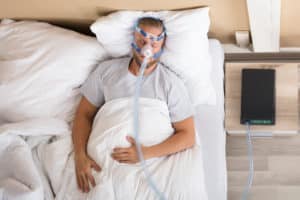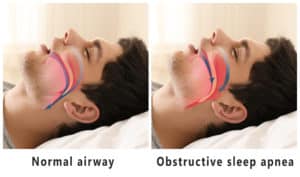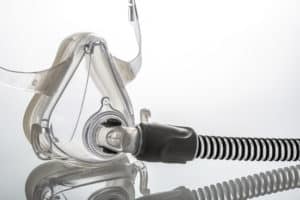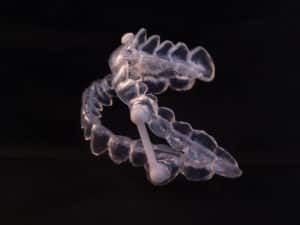CPAP vs. Oral Devices: Which is Better for Treating Obstructive Sleep Apnea?


The two most common methods of treating obstructive sleep apnea are CPAP machines and oral sleep apnea devices. Which one is better for your needs? Compare the pros and cons of each to help you decide!
What Is Sleep Apnea?
Do you get plenty of rest, but find yourself struggling to get through your day due to being tired? If you’ve done every trick in the book out there to find your sleep problem, try looking into a sleep apnea study. The National Sleep Foundation reports that more than 18 million Americans struggle with sleep apnea on a regular basis. This is a serious condition where breathing is obstructed during the night, which prevents proper oxygen flow to a person’s brain. That constant lack of oxygen is what disrupts sleep, so a deeper level of sleep is never achieved.
The “apnea” is when a person stops breathing for 10 seconds or more. Some patients can even go a minute or more between breathing, which severely limits oxygen flow to the brain, damaging cells. This can be life-threatening and deadly. During sleep, the throat muscles may relax too much, failing to keep the airway open so normal breathing can happen. With other patients, the lower jaw relaxes and the tongue falls back into the throat, blocking off air normal airflow. When the airway is blocked, it’s called “Obstructive Sleep Apnea”. No matter what type of apnea you have, you want to have a consultation immediately!

How Does CPAP Treat Sleep Apnea?
A highly effective method for treating obstructive sleep apnea is to wear a continuous positive airway pressure (CPAP) machine while you sleep. Oxford Academic’s study reported that obstructive sleep apnea is characterized by “snoring and repetitive pharyngeal collapse.” this means snoring or the throat becoming collapsed or closed during the night. Because of this, a CPAP machine was created to blow a constant stream of air down the throat to help keep your airways open.
Along with combating sleep apnea, CPAP also eases snoring and improves sleep quality. It is made for all severity levels of obstructive sleep apnea, whereas certain oral devices may not be able to treat severe cases the same.
The problem with a CPAP machine is that many people struggle to adapt to the machine. The small, lightweight machine sits on your nightstand. A large tube connects it to a mask that fits over your nose and mouth, which can be uncomfortable. Some side effects of using a CPAP machine include nasal congestion, dry mouth, nosebleeds, stomach bloating, chest discomfort, and feelings of confinement while wearing the mask.

How Do Oral Devices Treat Sleep Apnea?
If those side effects don’t appeal to you, consider an obstructive sleep apnea oral device, which we can custom-make in-office. Dr. Ania offers the MicrO2 Sleep Device, which we believe is the most advanced, effective oral appliance for treating mild to moderate obstructive sleep apnea. It resembles a mouth guard like those worn in sports.
The device snaps over the upper and lower teeth and stays small in the mouth. The Micr02 lacks cumbersome metal hinges, screws and elastics. We custom-make these devices to fit the shape of your mouth with control-cured PMMA, which makes it durable, precise and predictable. It’s less bulky, but helps clear up problems related to obstructive sleep apnea, without the side effects a CPAP machine can bring.
CPAP Vs. Oral Devices in Medical Studies
Honestly, it depends on how comfortable you want to be during your night when it comes to choosing what device you want for your obstructive sleep apnea. Medical studies have found that both CPAP machines and oral devices work wonders for keeping obstructive sleep apnea in check so you can get a great night’s rest. However, one is worn in the mouth, while the other is worn on the face and hooked up to a machine. Here are some pros and cons of both:
- The CPAP mask must be worn over the nose and mouth, strapped to the face. It may prevent you from being able to sleep on your side comfortably or on your stomach. In comparison, an oral device is worn inside the mouth without anything else being attached to your face.
- CPAP machines can be very loud as they blow that constant stream of air down the throat. You will have to be okay with the loud noise it makes, and so will a significant other. Oral devices don’t make noise, but still treat various levels of obstructive sleep apnea effectively.
- 30%-50% of CPAP wearers find the mask uncomfortable or the machine too loud.
- Compliance with wearing the CPAP machine (about 50%) is generally lower than compliance with wearing an oral device that is smaller and quieter.
- The CPAP machine is large, cumbersome, and requires electricity, whereas oral devices are small, portable and are easy to travel with.

Call for Your Free Consultation Today!
If either type of obstructive sleep apnea device works for your sleep situation, then try out both! Most insurances will cover a CPAP or an oral device because obstructive sleep apnea can be a life-threatening condition. However, you may only have a mild case of sleep apnea, which would not require you to need a CPAP. Studies have found that oral devices for mild to moderate cases are just as effective as a CPAP machine for “reducing the risk of fatal cardiovascular events.”
However, a CPAP machine is recommended for extremely or morbidly obese persons or those that have more severe cases of obstructive sleep apnea. Speak with your doctor about your medical situation, do the sleep studies required and see what oral device is best for you. Obstructive sleep apnea doesn’t have to interfere with your life or your sleep! To learn more about our oral devices and how they can help you get a better night’s sleep, call Dr. Ania’s office at 303-443-0998 for your free consultation!


